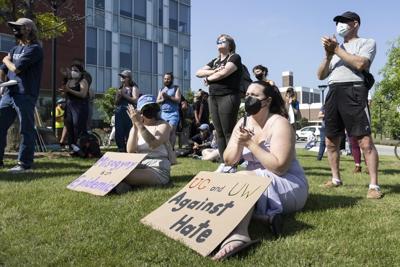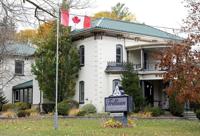Student associations demanded Monday that the Ontario government do more to address gender-based violence on post-secondary campuses, saying a triple stabbing at the University of Waterloo has shown further action is needed.
A University of Waterloo professor and two students were hospitalized after the late June stabbing at a gender studies class. Police allege it was a planned act motivated by hate related to gender expression and gender identity.
At a news conference Monday, leaders of the University of Waterloo's undergraduate student association and the Ontario Undergraduate Student Alliance said they want the province to order universities to conduct to an annual safety assessment and create a trauma-informed training program for campus security, among other recommendations.
"This is vital to cultivating a culture where prevention is the norm and where society as a collective can better look out for one another to mitigate harm in environments where students can feel safe and free," said OUSA's president Vivian Chiem.
"What happened at Waterloo is tragic and indicative of the growing sentiments around a world that targets and harms individuals from the LGBTQIA+ community."
Students also want to see the province working closely with universities, educators and students in creating a gender-based violence prevention framework for post-secondary institutions that outlines best practices and supports prevention programs, Chiem said.
The Ontario government did not immediately respond to a request for a comment on the student groups' demands.
Waterloo Regional Police have charged a 24-year-old recently graduated international student with multiple offences in the University of Waterloo stabbing, including three counts of aggravated assault. His next court date is on July 25.
On Monday, the student leaders said that although the stabbing was shocking, the alleged hate motivation involved was not.
"Results from our (recent) biannual survey ... which represents 160,000 students across the province, shows that 50 per cent of Two Spirit and LGBTQI+ students do not feel completely safe on campus, with seven per cent of them not feeling safe at all," Chiem said.
Police in Canada have said they've noticed an uptick in attacks against members of the LGBTQ community.
Chiem said the hostile environment is causing mental health issues among LGBTQ students.
"This is unacceptable and the provincial governments need to act promptly and effectively to ensure that those pursuing and providing education are safe," Chiem said.
Katie Traynor, vice-president of the Waterloo Undergraduate Student Association, said the response by the University of Waterloo to the stabbing has been appreciated so far but more can be done.
"We want to see more engagement from senior leadership not only through blanketed statements, emails or very minimal communication about updates ... but consistent, clear engagement and consultation with our community," she said.
The university's president and provost hosted community forums for staff and students on Monday to hear their concerns. The forums were not open to the public.
The student leaders said the privacy was necessary so campus community members could feel comfortable sharing their concerns.
"That fear of returning to campus, that fear of being vulnerable to attack, that fear of not trusting others around us ... is something that will keep on repeating in our minds every single day that we step foot onto our institution," Traynor said.
"This attack that occurred on our campus isn't isolated. We've seen this around the world and I think that's another point that students are taking very seriously."
This report by 春色直播was first published July 17, 2023.








































